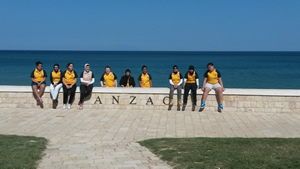
Wiley Park GHS students at ANZAC Cove, 2014
©Department of Education (Wiley Park GHS)
This section expands the learning concepts integrated into the teaching and learning activities listed in this resource. The concepts of challenge, change, caring, community and commemoration provide a focus for learning, class and student discussions and further investigation.
These concepts are explored in a series of five videos which compile interviews with students from Wiley Park Girls High School and teachers who visited Gallipoli on a school excursion in 2014. The students and accompanying teachers reflect on their experience, how it has changed them personally and the impact on the school community.
This section also explains opportunities for the integration of the Learning Across the Curriculum priorities and general capabilities relating to the Centenary of Anzac.
Five integration concepts have been highlighted to support the concept of ‘Bringing Communities Together.’
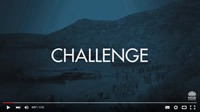
Australia faced enormous challenges as a newly federated nation going to war in Europe in 1914, including a small population spread over great distances and limited financial resources to support the war effort. These challenges were met with the usual ‘can do’ approach that is now seen as typically Australian, including the unknown number of Aboriginal and Torres Strait Islander service men and women who enlisted to protect our land. Watch ‘Challenge’.
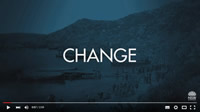
As the war effort gained momentum, communities needed to change. Community roles and responsibilities changed the way Australians interacted. The development of Australian patriotism was an important feature of this time. Technological advances during the First World War also resulted in changes and advances in society and everyday life such as radio, home appliances, first aid treatments and medical imaging. Watch ‘Change’.
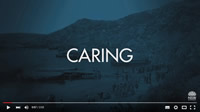
The conditions in which Australian and New Zealand troops fought and the dramatic increase in the loss of service men instigated a strong community response on the ‘home front’. A large number of voluntary care and fundraising organisations were established to fundraise, provide comfort items to soldiers, locate missing service men, provide support for widowed families and care for returned soldiers. Care is epitomised in the Australian concept as ‘mateship’. Today care and respect continues to be shown in Anzac Day and Remembrance Day commemorations. Watch ‘Caring’.
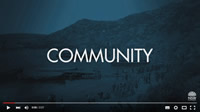
The First World War brought former colonies and different communities around Australia together as support for the war effort continued. The armed forces built a sense of loyalty within their ranks as diverse groups of men brought different sectors of society together. Broad links were forged that became a foundation for progress after the war. Australia’s strong sense of community is still evident in times of natural disasters when people from many walks of life come together to assist those in need. Watch ‘Community’.
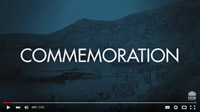
As the war came to an end the great cost in human lives was felt in Australian communities and as a nation. The continuing need to remember those who gave their lives is a defining feature of what it means to be an Australian. This is evident in the respectfully cared for war memorials located in almost every town and suburb in Australia. Watch ‘Commemoration’.
Learning across the curriculum content is embedded in the learning experiences relating to the Centenary of the Commemoration of the First World War. These priorities and general capabilities support the notion of bringing communities together in raising community consciousness and developing shared understandings.
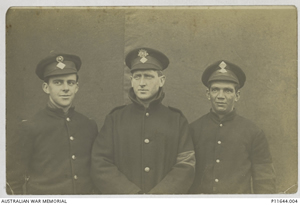
Group portrait of one British and two Australian prisoners of war (POW) interned at Stendal camp, Germany, 1918. Indigenous soldier (right) is most probably Private Walter Bright of Wagga Wagga
©Public domain (AWM P11644.004)
It has now been verified that at least 1300 Aboriginal and Torres Strait Islander men enlisted in the First World War. Learning about the significant contribution of Aboriginal and Torres Strait Islander service men and women supports reconciliation. While serving in the Australian Infantry Forces (AIF), Indigenous men were accepted without prejudice including being paid at the same rate. Upon returning home systemic discrimination continued or had worsened in the areas of education, employment and civil liberties.
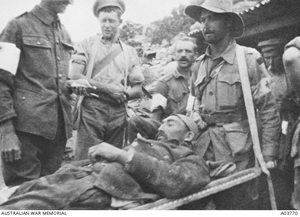
Wounded Turkish soldier is carried out of the 1st Australian Field Ambulance dressing station, Gallipoli 1915
©Public domain (AWM A03770)
The impact of the First World War on individuals, families and the community engages students in reflecting on their own personal views and supports the development of empathy. Learning about the lives of ordinary men and women during the First World War provides the opportunity for students to examine a range of motives and actions. Reflection on behaviours of people from the past enables students to strengthen their own ethical understanding.
Locating and evaluating sources used to learn about the First World War requires students to utilise information and communication technologies. There are expansive online and digitised collections of records, diaries, photographs and objects from the First World War. Students need to be selective and critical users of online archives and use problem solving strategies to identify a variety of sources that cross reference aspects of the First World War.
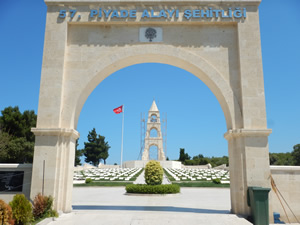
Cemetery of the 57th Turkish Regiment, Gallipoli, 2014
©Department of Education (Wiley Park GHS)
The cultural make up of Australia has changed considerably since the First World War with a greater diversity of cultures. This diversity includes families from countries that have been involved in war and conflict, such as people with Turkish, German or Japanese heritage. In order to bring communities together aspects of intercultural understanding need to be treated with sensitivity. The contribution of Aboriginal and Torres Strait Islander communities to all wars is significant and examining their challenges builds intercultural understanding.
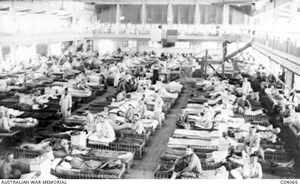
A ward at Luna Park, a former entertainment park used as an Australian Auxiliary Hospital in Heliopolis, Egypt, 1915
©Public domain (AWM C0465)
Learning about the First World War enables students to investigate the challenging situations in which people of the era where placed in at both the war front and the home front. Through examination of these challenges students can engage with the values related to the difficult choices and decisions of that time, make comparisons to their own lives and build empathetic understanding.
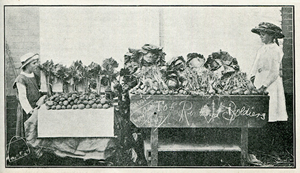
Students from Wyong Creek Public School with vegetables grown to sell to raise funds for returned soldiers, Education Gazette, 1 June 1918
©Department of Education (NSW Schoolhouse Museum of Public Education collection)
Students explore how the Australian nation responded to the First World War with regard to community support and volunteer organisations. In examining the changing roles in society, conscription debates, struggle of Aboriginal and Torres Strait Islander peoples for citizenship rights and care and support for returned soldiers are aspects of civics and citizenship.
Opportunities for civic action today can include contributing to the maintenance of memorials, involving armed forces personnel in school events and supporting retired armed service men and women.
